Swarthmore Welcomes 12 New Faculty Members to Campus
This fall, 10 Swarthmore faculty members begin tenure-track appointments across the disciplines and two faculty members embark on distinguished faculty appointments.
Faculty members receiving tenure-track appointments:
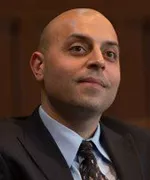
Associate Professor of Peace & Conflict Studies Sa'ed Atshan ’06
Sa'ed Atshan ’06 is an anthropologist specializing in peace and conflict studies, and chair of the Department of Peace and Conflict Studies. His research centers on contemporary Palestinian society and politics, global LGBTQ+ social movements, Quaker studies, and Christian minorities in the Middle East. This fall, he is teaching Intro to Peace and Conflict Studies and Contemporary Israel/Palestine.
Atshan first joined Swarthmore’s faculty in 2015; he has returned to the College after spending the past two years as associate professor of anthropology and director of undergraduate studies at Emory University.
After graduating from Swarthmore College in 2006, Atshan earned an M.P.P. from Harvard Kennedy School, an M.A. in social anthropology from Harvard, and a joint Ph.D. in anthropology and Middle Eastern studies. He has served as a visiting assistant professor of anthropology and senior research scholar in Middle Eastern studies at the University of California, Berkeley, and as a postdoctoral fellow at the Watson Institute for International Studies at Brown University.
Atshan is the author of Queer Palestine and the Empire of Critique (Stanford University Press, 2020). He is co-author of The Moral Triangle: Germans, Israelis, Palestinians (Duke University Press, 2020) and co-editor of Reel Gender: Palestinian and Israeli Cinema (Bloomsbury, 2022).
"It's a tremendous honor and privilege to serve alongside such brilliant colleagues in nurturing the intellects of this rising generation of Swatties who come from all walks of life."

Assistant Professor of Black Studies Jamal Batts
Jamal Batts is a visionary writer, curator, and scholar from Virginia Beach, Va. His work reflects on the relationship between Black queer contemporary visual art and the intricacies of sexual risk. This fall, Batts will teach Black Health Futures and The Pandemic Present. In the spring, he will teach Blackness In and Out of the Museum and Black Feminist and Queer Contemporary Culture.
Batts received his Ph.D. from the Department of African American and African Diaspora Studies at the University of California, Berkeley, after which he was a President’s Postdoctoral Fellow at University of California, Irvine, and a Stanford University Provostial Fellow in the Department of Art and Art History. He previously served as a University of Pennsylvania curator-in-residence, a 2020 Robert Rauschenberg Foundation scholar-in-residence, a Center for Curatorial Leadership Mellon Seminar member, a 2020 Ford Foundation dissertation Fellow, and ONE National Gay & Lesbian Archives LGBTQ research fellow.
Batts’ writing appears in the catalog for The New Museum’s exhibition Trigger: Gender as a Tool and a Weapon, as well as Open Space, ASAP/J, New Life Quarterly, and SFMOMA’s website in conjunction with their Modern Cinema series. Batts is a member of the curatorial collective The Black Aesthetic, who have organized four seasons of Black experimental film screenings and published three edited collections.
"Black Studies is the field that raised me and I'm honored to carry on this radical tradition at Swarthmore College. I look forward to working with students as we study how to create a more just world via transdisciplinary perspectives that recognize the foundational importance of Black feminism, Black queer studies, art, and visual culture."
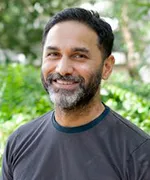
Assistant Professor of Art Sony Devabhaktuni
Sony Devabhaktuni is an architect and writer whose research focuses on urban infrastructures and collaborative processes in design. His work looks at the overlapping of economic, social, and political intensities with imaginations of space. Devabhaktuni is teaching Architectures of Air: Environments in Movement this fall.
Previously, Devabhaktuni served as assistant professor of design in the Department of Architecture at the University of Hong Kong and as a design studio instructor in the first-year architecture program at the Swiss Federal Institute of Technology, Lausanne.
Devabhaktuni has a B.A. in English and international relations from Stanford University, a Bachelor of Architecture from The Cooper Union for the Advancement of Science and Art, and a Master in Indian Studies from the Université Sorbonne Nouvelle.
Curb-scale Hong Kong: Infrastructures of the Street, Devabhaktuni’s first solo book, uses drawing and writing to describe the social and material relations that articulate the street as a shared public realm. He is the co-author of As Found Houses: Experiments from Self-builders in Rural China – the winner of the 2021 Royal Institute of British Architects President’s Medal for Research. Devabhaktuni's writing has appeared in peer-reviewed journals including the Architectural Theory Review, Public Culture and Global Performance Studies, and in important forums for public scholarship on architecture.
“I'm excited to work with students at Swarthmore on issues around the design and care of the built environment and all that this implicates in terms of climate, social justice, and the right to inhabit spaces that sustain us.”

Associate Professor Film & Media Studies Rodney Evans
Rodney Evans is an award-winning film writer, director, and producer renowned for his contributions to fiction and documentary filmmaking. His films explore the intersections of race, class, and sexuality. Evans joined Swarthmore’s faculty in 2015.
Evans' films have been screened at over 30 film festivals worldwide, such as the Sundance Film Festival, Berlin International Film Festival, Tribeca Film Festival, and Blackstar Film Festival. His films include shorts, like his recent Portals, and feature-length films such as Brother to Brother, The Happy Sad, and Vision Portraits.
Evans earned a B.F.A. in Modern Culture and Media from Brown University, and an M.F.A. in Film/Video Production from California Institute of the Arts. Evans was a Guggenheim fellow, grantee of the Ford Foundation’s JustFilms Program, and recipient of the Creative Capital Foundation Grant. Previously, he taught at New York University’s Tisch School of the Arts and Princeton University.

Assistant Professor of Psychology Emily Foster-Hanson
Emily Foster-Hanson is a psychological researcher who specializes in conceptual development and social cognition. Foster-Hanson’s lab at Swarthmore will study how children learn about categories and norms, especially through the social interactions they have with people around them in their daily lives. She is teaching Developmental Psychology this fall.
Foster-Hanson earned a B.A. in linguistics from Yale University and a Ph.D. in psychology from New York University. Her doctoral research was funded by an NICHD F31 Ruth L. Kirschstein National Research Service Award from the National Institutes of Health. After receiving her Ph.D., Foster-Hanson was a postdoctoral research associate in cognitive science of values at Princeton University.
Foster-Hanson’s research has been published in journals including Cognitive Science, Cognitive Psychology, and Journal of Experimental Child Psychology. Recent works include "Stereotypes as prototypes in children’s gender concepts," published by Developmental Science.
“I’m thrilled to be joining the vibrant and inclusive academic community at Swarthmore! I look forward to building new connections with students and faculty across disciplines and inspiring the next generation of diverse psychology scholars.”
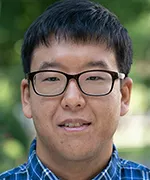
Assistant Professor of Economics Paul Ko
Paul Ko’s scholarship resides in international economics, macroeconomics, trade, and the intersections of these areas. This fall, Ko will teach Introduction to Economics.
Ko is engaged in multiple ongoing works, including examining global and local impacts on the labor share decline, investigating determinants and interlinkages in international environmental cooperation, and trade and structural change in African economies. Ko also explores intersections of gender and international economics, like the effects of trade and automation on the male employment gap, as well as the effects of trade on female labor force participation in developed economies.
Ko received a B.S. in economics, a B.S. mathematics, and a minor in Japanese from Carnegie Mellon University. At Penn State University, Ko completed a Ph.D. in economics and taught macroeconomics. Following his time at Penn State, Ko went on to teach macroeconomics at Dickinson College.
“I am thrilled to be here! I am very excited to work with many accomplished colleagues and to engage with brilliant students at Swarthmore. I look forward to bringing my scholarship in international economics to the Swarthmore community and discussing what 'globalization' means and where it is headed. It is exciting to be part of the community where members are fully committed to making our future and the world a better place for all."
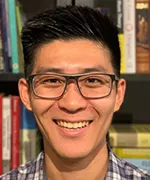
Assistant Professor of Mathematics & Statistics Joseph Nakao
Joseph Nakao specializes in scientific computing, mathematical modeling, and LGBTQ+ representation in mathematics. Nakao’s research focuses on bridging computational mathematics with engineering applications, particularly in developing algorithms to address complex challenges in fluid dynamics and plasma physics.
Nakao has a B.S. in applied mathematics from Seattle University, and an M.S. and Ph.D. from the University of Delaware. His work has been featured in publications like the Journal of Computational Physics. He is on the editorial board of MAA FOCUS, the newsmagazine of the Mathematical Association of America, and the board of directors for Spectra, the association for LGBTQ+ mathematicians.
"I am delighted to join the Swarthmore College community and contribute to its ongoing efforts to increase its scholarship, teaching, and diversity. I look forward to meeting many bright and passionate students in my mathematics courses and around campus."
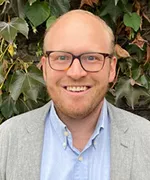
Assistant Professor of Political Science Warren Snead
Warren Snead’s work examines the intersection of law and public policy, with a focus on the United States Supreme Court. More broadly, Snead is interested in American political development and political institutions. Snead will teach Constitutional Law and Politics I: Institutional Powers and Constitutional Law and Politics II: Civil Rights and Civil Liberties in the fall, as well as Judicial Politics in the spring.
Snead's education includes a B.A. in political science from Sewanee. From there, he went on to receive an M.A. and Ph.D. in political science from Northwestern University. His forthcoming book examines how the Supreme Court affects policy development through statutory interpretation using the case studies of the National Labor Relations Act, Voting Rights Act, Social Security Act, the Clean Air Act, and the Clean Water Act. His writing has been published in the American Political Science Review and the Chicago Tribune.
“I'm very grateful to be joining the Swarthmore community this fall. I'm especially looking forward to teaching curious and highly motivated students in a liberal arts environment.”
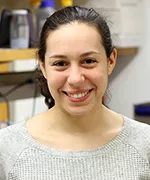
Assistant Professor of Chemistry & Biochemistry Sara Sohail
Sara H. Sohail is a prolific researcher who specializes in chemistry and biochemistry. Sohail will teach Physical Chemistry I & II this fall.
Sohail graduated from Haverford College with high honors in chemistry before pursuing her Ph.D. in chemistry at the University of Chicago. After receiving her Ph.D, Sohail was a Nancy Nossal Postdoctoral Fellow at the Laboratory of Chemical Physics at NIH.
Sohail has published in the Proceedings of the National Academy of Sciences, Chemical Science, The Journal of Physical Chemistry Letters, and The Journal of Chemical Physics.
“I’m thrilled to be joining the Swarthmore community. I look forward to teaching chemistry as part of a well-rounded liberal arts education, while building a vibrant research program fueled by our bright, motivated students.”
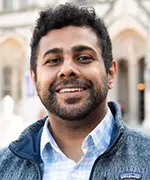
Assistant Professor of Computer Science Sukrit Venkatagiri
Sukrit Venkatagiri is an accomplished researcher in the field of computer science who specializes in human–computer interaction (HCI) and mis/disinformation studies.
At Swarthmore, Venkatagiri will direct the Collective Resilience Lab, continuing work to resist strategic misinformation and other types of technologically mediated harm. The lab will build sociotechnical systems to repair trust in each other and our institutions and empower people to advocate for their rights while refusing unethical data and labor practices. This fall, he will teach Social Computing, where students will explore how technology enables and shapes human social interaction and learn how to design more ethical technology.
After earning an M.S. and Ph.D. in computer science from Virginia Tech, Venkatagiri was a postdoctoral scholar at the University of Washington, where he supported election officials and civil society organizations to defend our elections against those who seek to undermine them by exploiting our online information environments. Previously, Venkatagiri conducted research at Virginia Tech, Facebook, Microsoft Research, the University of Georgia, and PES University. He has been featured in articles by Washington Post, Inside Higher Ed, Reuters, and Forbes.
"Understanding and solving today's complex, global problems — from misinformation to climate change — requires an interdisciplinary perspective. I'm incredibly excited to be at Swarthmore because interdisciplinarity is valued and nurtured. Through my teaching and scholarship in HCI, I hope to instill in students the skills to make the world a better place, the courage to defend the rights of marginalized people, and the humility to recognize the limitations of technology.”
Faculty members receiving distinguished faculty positions:

Eugene M. Lang Visiting Professor of Issues for Social Change Ted Gup
Ted Gup is an esteemed journalist, award-winning author, and longtime educator. Gup was a Guggenheim fellow and Pulitzer Prize finalist. He is a former staff writer and editor for The Washington Post. Gup also wrote for and edited Time magazine and has appeared in The New York Times, Mother Jones, The Nation, Politico, The New Republic, The Guardian, The Boston Globe, The Chronicle of Higher Education, Columbia Journalism Review, Huffington Post, NPR, the Harvard International Journal of Press and Politics, National Geographic, Slate, and GQ, among other outlets. This fall he is offering Investigative Journalism as an Agent of Social Change.
"It was impossible for Swarthmore students to live up to all the hype, their reputation for passionate and engaged scholarship, their independent spirit, their willingness to grapple with fundamental questions. Impossible. Well, what can I say? It’s all true. How could I be so fortunate as to be given the opportunity to work with such students? I guess I’m just impossibly lucky."

Julien and Virginia Cornell Visiting Professor Amanda Keddie
Amanda Keddie is a professor of education at Deakin University in Melbourne, Australia. Amanda’s research examines the schooling processes, practices, and conditions that can impact on the pursuit of social justice in education, including student identities, teacher identities, pedagogy, curriculum, leadership, school structures, policy agendas, and sociopolitical trends. Amanda is teaching Gender and Education in the fall, and in the spring she will teach Classroom Research for Social Change.
"I am really looking forward to building sustained and ongoing relationships and collaboration with faculty and students. The scope and depth of research across the College and within education studies is incredible. I am excited to be part of the liberal arts education ethos around student-centered critical and dialogic learning."



